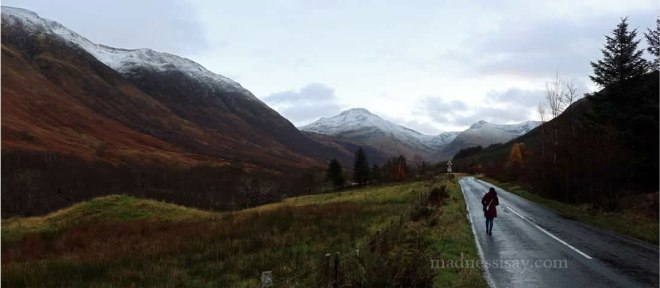The Land
Living in Canada means going through the 5 stages of grief every year, coming to terms with how the greenery literally degenerating into a crunchy and listless shade of brown– signals the start of the steady decline. The promise of the first snowfall is a unique flicker of hope in this dreadful season, a moment where society permits taking pause to admire the barely perceptible flakes that melt into nothingness. They float carelessly downward, and the world goes deafly silent–almost as if a real glass dome covered overhead.
This relationship with snow is very short-lived.
Strangely enough, the sight of snow away from home fills me with happiness, to the point of being giddy. I find myself frantically scanning the horizon, looking for anything snowcapped–even if it’s just a small hill. They’re so beautifully isolated, too far out of reach for anyone to desecrate through unceremonious stomping, but still so familiar.

The People
I have been very fortunate in the last couple of years, to be able to meander far from home and to meet new people. It’s important to be receptive to others, what they care about, things that they think are important, things that are aggravating. Even outside of travel (which is nice, but a luxury), for better or worse, everyone has something to teach you. The people we met in Scotland embraced us, told us where they came from–where they hoped they were going. It wasn’t lost on me that these threads of warmth and welcome were things I recognized from the Canadian cultural tapestry.
We (my SO and I) were only in Scotland for 4-5 days, coming to Edinburgh from London by train. From the window, I saw some of the greenest pastures I had ever laid eyes on, almost unnaturally bright even under an overcast sky. Arriving in Waverly station, we felt self-conscious and awkward, struggling to maneuver our luggage around local commuters.
All of that washed away when we arrived at our Airbnb, greeted by our friendly host. She was originally from the Highlands, which meant it was a matter of honour to go above an beyond to help these exhausted travelers from Canada. On her recommendation, we spent an entire day getting lost in the National Museum of Scotland, a monument to the knowledge of everything (if there ever was one). Before we left for Glencoe in the Highlands, she drew us multiple maps showing which routes to take, and where we absolutely had to eat. We were very lucky to have met her.
While in the city, we were on the hunt for British-Indian food, a unique, fusion cuisine that had resulted from longevity of British India. Being Indo-Canadian, I had always wondered how members of the same diasporic communities had diverged as people settled around the world. What new traditions had people created? What did they keep?It was a complete mystery until we stumbled into Pakora Bar in Edinburgh. The owner elaborated, much to our delight, on his family’s history and how they had first settled in Glasgow. He gestured behind the counter at a painting of a turbaned man, a Sardar, wearing a jacket and pants with a plaid pattern–watching over the restaurant. This man, his grandfather, had created the Singh Tartan for all of “Asian origin” to use–I had been welcomed into the fold.
Soon after, we winded our way up north to the shores of Loch Leven, where we had rented a private room in a beautiful B&B. Our host here was also overflowing with warmth, sharing with us how she had felt unfulfilled as a lawyer in the too-big city, one day just leaving it all behind. She had been gutsy, if not short-sighted. But she seemed happy–a cheerful person who almost sang her phrases and showered blessings on all those who crossed her threshold. As we left the B&B, we could hear laughter. She could be heard befriending a woman, a stranger, who had grown up in this house. They lightheartedly gossiped about how little had changed.
I think I’ll go back.